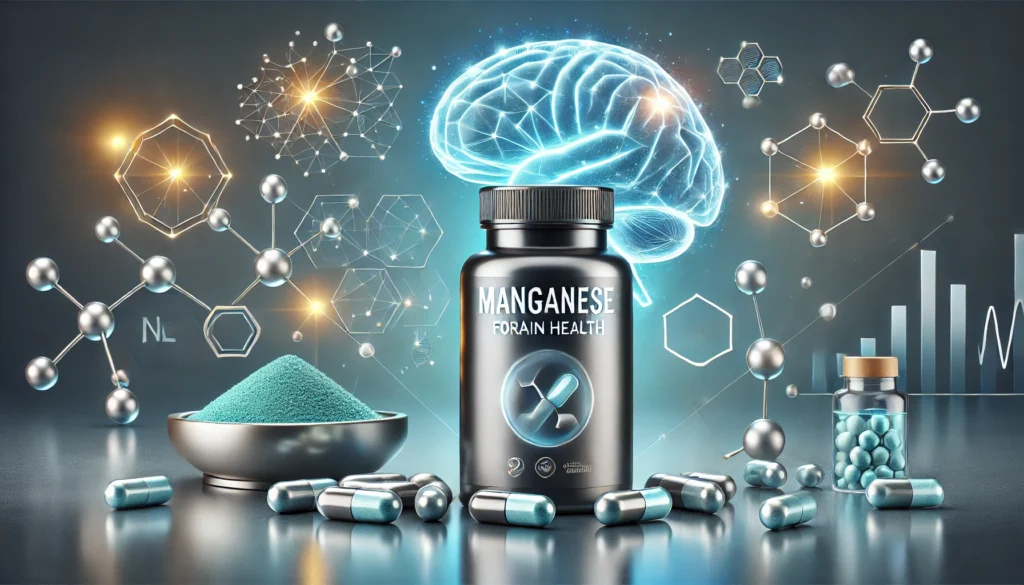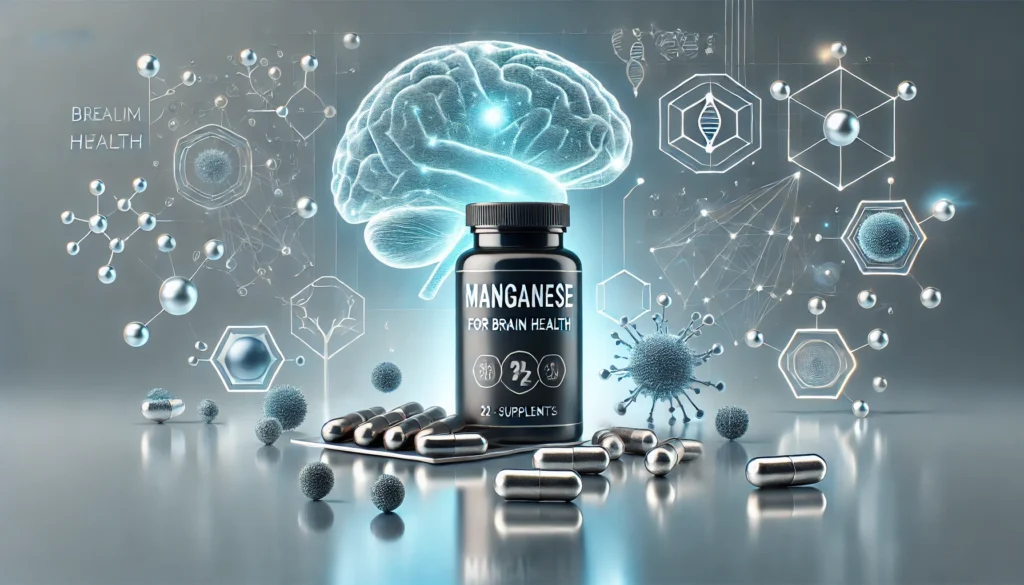Manganese is an essential trace mineral that plays a pivotal role in various physiological functions, including enzymatic reactions, antioxidant defense, and metabolism. Though present in small amounts within the human body, manganese is indispensable for numerous biochemical processes, including the regulation of brain health and cognitive functions. In recent years, there has been growing interest in manganese as a potential nootropic supplement due to its neuroprotective qualities and role in supporting metabolic and neurological health. This article explores the scientific background, physiological mechanisms, potential nootropic benefits, dosing guidelines, side effects, and interactions associated with manganese supplementation.
You May Also Like:
Manganese: Potential Nootropic Benefits, Dosage, Side Effects, Interactions and Other Important Information About This Supplement is an original (NootropicsPlanet) article.
Sources of Manganese
Manganese is naturally found in a variety of foods, with plant-based sources generally providing higher amounts than animal products. Major dietary sources of manganese include:
- Nuts and Seeds: Almonds, hazelnuts, and pumpkin seeds are high in manganese.
- Whole Grains: Brown rice, oats, and whole wheat offer substantial manganese content.
- Legumes: Chickpeas, lentils, and beans are also rich sources.
- Leafy Green Vegetables: Spinach and kale provide manganese along with other essential nutrients.
- Fruits: Pineapple, blackberries, and blueberries contain moderate amounts of manganese.
- Tea: Both green and black teas are notable sources due to manganese in tea leaves.
While many individuals can meet their manganese needs through diet, specific health conditions or increased metabolic demands may make supplementation necessary.

Chemistry of Manganese
Manganese is an element with the atomic symbol Mn and atomic number 25. It commonly exists in oxidation states of +2, +3, +4, +6, and +7, with Mn(II) being the most biologically active form. In the human body, manganese primarily functions as a cofactor for enzymes, which means it assists in catalyzing biochemical reactions without being consumed in the process. These enzymes include manganese superoxide dismutase (MnSOD), arginase, and pyruvate carboxylase.
MnSOD, an antioxidant enzyme localized in the mitochondria, is one of the primary defenses against oxidative stress. It helps neutralize free radicals by converting superoxide anions into hydrogen peroxide, which is subsequently broken down into water. This antioxidant function is particularly vital in the brain, where high oxygen consumption leads to an increased risk of oxidative damage.
Physiological Mechanisms of Manganese in the Body and Brain
Manganese’s primary physiological roles include:
- Antioxidant Defense: Manganese is essential in the synthesis of MnSOD, a powerful mitochondrial antioxidant enzyme. MnSOD mitigates oxidative stress by neutralizing free radicals in neuronal tissues, which is crucial for protecting the brain from oxidative damage that may lead to neurodegenerative diseases.
- Energy Metabolism: As a cofactor for enzymes such as pyruvate carboxylase, manganese plays a role in glucose metabolism and energy production. Pyruvate carboxylase is necessary for gluconeogenesis, the process of generating glucose, which is critical for maintaining a consistent energy supply for the brain.
- Neurotransmitter Synthesis: Manganese is involved in the synthesis of dopamine and glutamate, neurotransmitters essential for cognition, mood regulation, and motor function. This role is particularly relevant for manganese’s nootropic potential, as both dopamine and glutamate are closely tied to learning, memory, and focus.

Nootropic Benefits of Manganese
Research on manganese as a nootropic is still emerging, but several cognitive benefits have been proposed based on its biochemical roles.
- Enhanced Brain Antioxidant Defense: Manganese, through its role in MnSOD, helps reduce oxidative stress in the brain. By supporting mitochondrial function and reducing the harmful effects of free radicals, manganese may protect neural cells from damage, potentially lowering the risk of cognitive decline and neurodegenerative diseases.
- Improved Cognitive and Memory Function: Due to its involvement in energy production and neurotransmitter synthesis, manganese supports mental clarity, concentration, and memory retention. Although manganese deficiency is rare, inadequate levels can impair brain function, particularly in memory formation and executive function.
- Mood Regulation: Manganese contributes to the synthesis of dopamine, a neurotransmitter involved in mood and motivation. This connection suggests that manganese may indirectly support mood regulation and may be beneficial for individuals experiencing mild cognitive disturbances related to mood imbalance.
- Enhanced Neuroplasticity: Manganese’s involvement in glutamate synthesis may influence neuroplasticity, the brain’s ability to adapt and reorganize neural pathways. Glutamate is a key neurotransmitter involved in learning and memory, and manganese’s role in its metabolism suggests potential for supporting cognitive flexibility.

Dosage and Supplementation Guidelines
The recommended dietary allowance (RDA) for manganese varies by age and sex, but for adults, it generally ranges from 1.8 mg for women to 2.3 mg for men daily. However, these values are based on typical dietary intake for overall health rather than cognitive enhancement.
- General Nootropic Dosage: Although there is no standardized nootropic dosage for manganese, most supplements provide manganese in doses ranging from 2-5 mg daily. This amount is usually sufficient to meet the body’s needs without exceeding safe limits. It is advised to consult a healthcare provider before starting supplementation, especially if taking manganese for cognitive health.
- Supplement Forms: Manganese is available in various forms, including manganese gluconate, manganese sulfate, and manganese citrate. These forms have different absorption rates, with manganese citrate generally considered more bioavailable. When selecting a manganese supplement, individuals may benefit from pairing it with other minerals or vitamins, such as calcium or magnesium, for balanced mineral support.
- Safety in Supplementation: Manganese is typically safe when consumed within the RDA. However, prolonged intake of high doses (greater than 11 mg per day for adults) may lead to adverse effects. Given manganese’s long half-life in the brain, high doses over extended periods can lead to accumulation, which may have neurotoxic effects.
Side Effects and Safety Considerations
Manganese is generally safe when consumed in recommended doses, but excessive intake can result in side effects, particularly with high-dose supplements.
- Neurotoxicity: Prolonged exposure to high levels of manganese, especially through inhalation (as seen in certain industrial environments), can result in manganese toxicity, also known as manganism. Manganism is a neurodegenerative condition resembling Parkinson’s disease and is characterized by motor dysfunction, cognitive impairment, and psychiatric symptoms. Therefore, individuals should be cautious with long-term high-dose supplementation.
- Gastrointestinal Disturbances: In some cases, high doses of manganese supplements may cause digestive discomfort, including nausea, diarrhea, or abdominal pain. It is recommended to take manganese with food to reduce gastrointestinal irritation.
- Risk for Individuals with Liver Disease: Manganese is primarily excreted via bile, so individuals with impaired liver function may have difficulty clearing excess manganese, leading to accumulation and potential toxicity.

Interactions with Other Supplements and Medications
Manganese can interact with various supplements and medications, impacting its absorption and bioavailability. Understanding these interactions is essential to prevent adverse effects and ensure safe supplementation.
- Iron Supplements: High levels of iron can inhibit manganese absorption, as both minerals compete for similar transport mechanisms in the intestines. To optimize absorption, individuals may consider spacing out manganese and iron supplements.
- Calcium and Magnesium Supplements: Both calcium and magnesium can interfere with manganese absorption when taken in high doses. However, balanced intake of these minerals is essential for optimal health, so it is advisable to avoid megadoses of any single mineral.
- Antipsychotic Medications: Manganese levels may interact with certain antipsychotic drugs, potentially exacerbating side effects or reducing drug efficacy. It is recommended that individuals taking antipsychotic medications consult a healthcare provider before supplementing with manganese.
- Chelation Therapy: In cases of heavy metal poisoning, chelation therapy is used to remove toxic metals from the body. Chelating agents may also bind to manganese, lowering its levels in the body and potentially resulting in deficiency if used over an extended period.
- Other Nootropic Supplements: Manganese can be safely combined with various nootropics, such as omega-3 fatty acids or B vitamins, to support brain health. However, individuals taking stimulant nootropics, such as caffeine, should exercise caution, as manganese may enhance stimulatory effects on the central nervous system.
Risks for Individuals with Specific Health Conditions
While manganese is safe for most individuals within the recommended intake range, those with certain health conditions should be cautious with supplementation.
- Liver Disease: As the liver is essential for manganese clearance, individuals with liver disease may have an increased risk of manganese accumulation. This buildup can lead to neurotoxicity and should be closely monitored.
- Neurodegenerative Diseases: Due to manganese’s potential to accumulate in the brain, individuals with neurodegenerative conditions like Parkinson’s disease should consult their healthcare providers before using manganese supplements.
- Pregnancy and Breastfeeding: Although manganese is essential for fetal development, pregnant and breastfeeding women should avoid high doses beyond the recommended intake levels due to potential risks to both mother and child.
Conclusion: Should You Consider Manganese as a Nootropic?
Manganese is a versatile trace mineral with important roles in antioxidant defense, energy metabolism, and neurotransmitter synthesis. While manganese’s essential nature for neurological health is well-established, its use as a nootropic supplement is more nuanced and should be approached with caution. For individuals considering manganese to enhance cognitive health, adherence to recommended dosages and awareness of potential side effects and interactions are crucial.
Though preliminary evidence supports manganese’s role in brain health and cognitive functions, further research is needed to establish its efficacy as a nootropic. Those interested in manganese supplementation should consult a healthcare provider to determine if it aligns with their individual health needs and goals, particularly if taking manganese for neuroprotective benefits.

References:
- 10 Evidence-Based Benefits of Manganese. Retrieved from: https://www.healthline.com/nutrition/manganese-benefits
- Manganese Fact Sheet for Health Professionals. Retrieved from: https://ods.od.nih.gov/factsheets/Manganese-HealthProfessional/
- Manganese – Uses, Side Effects, and More. Retrieved from: https://www.webmd.com/vitamins/ai/ingredientmono-182/manganese
- What are the benefits and effects of manganese? Retrieved from: https://www.medicalnewstoday.com/articles/325636
Important Note: The information contained in this article is for general informational purposes only, and should not be construed as health or medical advice, nor is it intended to diagnose, prevent, treat, or cure any disease or health condition. Before embarking on any diet, fitness regimen, or program of nutritional supplementation, it is advisable to consult your healthcare professional in order to determine its safety and probable efficacy in terms of your individual state of health.
Regarding Nutritional Supplements Or Other Non-Prescription Health Products: If any nutritional supplements or other non-prescription health products are mentioned in the foregoing article, any claims or statements made about them have not been evaluated by the U.S. Food and Drug Administration, and such nutritional supplements or other health products are not intended to diagnose, treat, cure, or prevent any disease.


